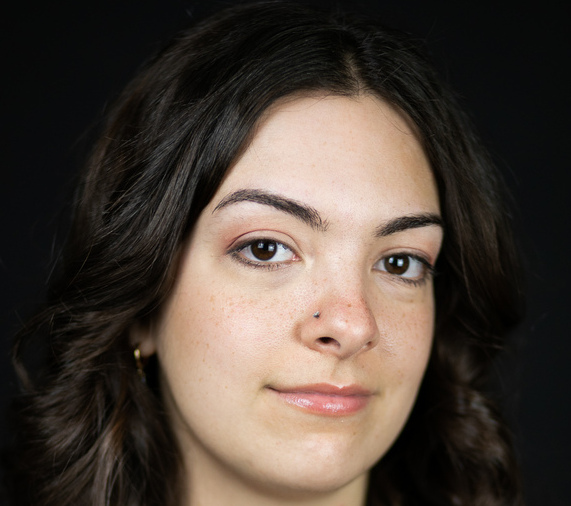
Associate Editor Connor Yeck: We’re delighted to publish an excerpt from Parade Stone’s play In the Same Space as our debut miCRo drama feature. Through the play’s intimate examination of the colliding lives of Bed Stuy residents, Stone presents a glimpse of a larger experience, endlessly concerned with place, community, and the pressures of passing time. To provide context for the full-length work from which this piece was taken, read Stone’s brief author’s note below.
from In the Same Space
Author’s Note: On a block underneath the J train, Chuck, a Brooklyn native, and Emma, a Manhattanite, debate their right to call Bed Stuy home. Tina and Sallie, sisters who grew up in the apartment above their family’s laundromat, make plans to sabotage their mom’s building sale. Emmanuel tests the waters of his secret queer desires by befriending the new line cook, Daniel, at the neighborhood’s twenty-four-hour diner. Punctuated by the thunderous and omnipresent passage of the train, and of time itself, these residents of Bed Stuy seek connection, resist displacement, and piece together their experiences in a neighborhood on the brink of gentrification and change.
In this particular excerpt, which opens the play, the audience meets Gabby, the play’s narrator. Gabby opens the show as she introduces the audience to the world of the play and the community of this ever-changing neighborhood. Later in the excerpt, the audience meets Chuck, a Bed Stuy native, and Emma, a native New Yorker who grew up in a wealthy family on the Upper West Side. This interaction sets the tone for both of their experiences as their histories, levels of privilege, and desire to belong spark.
Setting:
Bedford-Stuyvesant (Bed Stuy), Brooklyn
ACT 1: Summer 2015
ACT 2: Summer 2019
Characters in excerpt:
CHUCK: Black, early to midtwenties
EMMA: Biracial (Black and white), early to midtwenties
GABBY: Dominican American, early to mid twenties, speaks fluent Spanish
Script Notes:
- A slash (/) indicates that a character is interrupting another character.
- If a piece of dialogue is italicized, the actor should put emphasis on it.
Act 1—Like Thunder
Summer 2015
1.
(Bed Stuy at dawn. An apartment stands at the corner of Broadway with a view of the establishments under the elevated J-train line.
The birds chirp, and the sun begins to rise over the apartment, Lucky Laundromat, and Angie’s Breakfast Spot, a twenty-four-hour diner that sits on what some would consider the Bushwick side of Broadway.
GABBY enters from inside the diner, wearing an apron. She retrieves a pack of cigarettes from her apron pocket and holds a cup of coffee in her other hand. She struggles to balance holding the coffee while lighting the cigarette. Finally, she lights it and inhales deeply. She exhales. She addresses the audience.)
GABBY: You gotta get out of New York sometimes, right? Especially in July. You breathe in this, like, hot garbage smell every day. It’s not cute. (She takes a deep inhale from her cigarette.) I never leave, though, ’cause I’m always working. But here’s what I imagine it’s like for other people. You leave your ’hood and think, “Finally, I can breathe again.” You take in the clean air, somewhere in the suburbs, and admire the houses that all look the same. I don’t know, maybe there’s even a hiking trail nearby. A private pool. You think to yourself, “This is what breathing feels like.” Just in and out. So easy.
(She enjoys the fantasy. A low rumbling begins.)
And just as this beautiful fuckin’ suburban reverie lulls me into a state of perfect relaxation, the train makes an entrance too loud to ignore.
(The sound of train announcements can be heard over the rumbling; “This is Marcy Avenue, Hewes Street, Lorimer Street, Flushing Avenue, Myrtle/Broadway, Kosciuszko Street, Gates Avenue, Halsey Street.”)
I stand underneath the train as it bangs down the track on its way to Jamaica, and I take a sharp inhale. And another and another and it gets faster and faster and I think, “Shit! This is what breathing really is and there’s nothing easy about it.” God, I mean, here we are, grinding so hard every day. Your breathing is the only thing that’s permanently yours in this place.
(The rumbling grows even louder and closer. Gabby is practically shouting, fighting to be heard.)
It’s okay, though! I love my lungs! I have to! You don’t need them in the suburbs the way you do in New York!
(The elevated train makes a thunderous entrance, its shadow covering Gabby as she drops her cigarette and walks back inside Angie’s Breakfast Spot.)
2.
(Morning. CHUCK enters from the apartment on the corner with a speaker in hand. He sets it up on the stoop. The speaker blasts a hip-hop song loud enough to wake up the neighbors. The song is unapologetic—something like Drake’s “Trophies” or “Jumpman.” CHUCK disappears back inside the apartment, leaving the music to play.
GABBY exits the diner, as her shift has ended. She stares at the lone speaker. She crosses the street to the apartment as CHUCK emerges from the building with weights in hand.)
GABBY: Yo! It’s 7 a.m.!
CHUCK: ’Sup, Gabby?
GABBY: You tell me.
CHUCK: What? The weights?
GABBY: The weights, the Drake. You deadass wanna wake up the whole block.
CHUCK: Maybe.
GABBY: I’m just saying, it’s mad loud.
CHUCK: You think anyone but New York niggas say “deadass?”
(This repetition sequence is a kind of game between the two.)
GABBY: Deadass no.
CHUCK: Deadass right.
GABBY: Deadass.
CHUCK: Deadass.
GABBY: Deadass.
CHUCK: Deadass.
GABBY: It sounds like you’re saying dat ass.
CHUCK: (flirty—but also messing with her) Maybe I am.
GABBY: Oh my god, just turn down the music. You’re gonna piss people off.
CHUCK: (lowering the music) Aight, shit. I wasn’t tryna bother you. (He begins vigorously lifting weights.)
GABBY: I’m not bothered but—what are you doing?
CHUCK: Lifting weights.
GABBY: Yeah, I can see. But why?
CHUCK: This is the best way to start your day.
GABBY: Right . . . Chuck, are you doin’ okay?
CHUCK: Yeah. Why?
GABBY: Well, you know, you weren’t blasting “Best I Ever Had” every morning before your um, before your uncle uh . . . Well, you know.
CHUCK: Uh-huh.
GABBY: So, I just think if you’re feeling like, down, that would make sense/
CHUCK: That song sucks.
GABBY: What?
CHUCK: “Best I Ever Had.” It sucks for working out.
GABBY: . . . Okay.
CHUCK: It’s too smooth. But it’s pretty good for (suggestive) other things. (He sings “Best I Ever Had”).
GABBY: (in encouragement) Okaaaay. Your voice sounds good. Seriously!
CHUCK: Thank you. I been practicin’ a bit.
GABBY: Word. Next time I’m on the J, I’m gonna see you come through like, “Showtime!” And everyone’s probably gonna put in their headphones because that’s what people do, but I won’t.
CHUCK: Bullshit. People love Showtime.
GABBY: No. They really don’t.
CHUCK: I’d probably make more in tips than you do from it.
GABBY: Woooow.
CHUCK: I’m just messin’.
GABBY: Yeah, all right. I need to take a nap now. Goodbye.
CHUCK: Word, okay. I’ll see ya.
(GABBY starts to exit.)
CHUCK: Hold up! Gabby?
GABBY: Yeah?
CHUCK: Uh, how’s your mom? Is she good?
GABBY: (The answer is no but . . . ) She’s fine.
CHUCK: (nods, knowing she’s lying) Good. Well, I’ll see ya soon.
GABBY: Yeah. Bye, Chuck.
(GABBY exits. CHUCK continues lifting weights. He counts his reps as he lifts.)
CHUCK: One. Two. Three. Four. Five. Six. Seven. Eight.
(EMMA enters with headphones on, carrying a basket overflowing with laundry. She listens to a popular song of the time in the vein of neoliberal bad-bitch female empowerment—something like Rihanna’s “Bitch Better Have My Money.” The song fills the stage like a music video. It’s as if we are seeing the world from her perspective.
She stumbles, and a pile of her clothes falls onto the sidewalk, interrupting her music-video moment.)
EMMA: Shit.
CHUCK: Hey! Can I help you with that?
EMMA: Sorry, what?
CHUCK: Can I help you carry your laundry?
EMMA: Uh, no. Thanks.
CHUCK: I’m not tryna be weird. It just looks heavy, so/
EMMA: I’m good. Thank you.
CHUCK: You listen to your music loud.
EMMA: Oh. Uh, yeah. Drowns out the train.
(EMMA collects the rest of her laundry quickly. As she begins to exit, a piece of clothing falls from the basket. EMMA doesn’t notice, and CHUCK picks it up off the ground. He jumps up from his seated position to hand it to her. They speak over each other.)
CHUCK: Hold up, hold up. Do you need this/
EMMA: I don’t have any money, sir, I’m sorry/
CHUCK: What?
(EMMA sees the clothing in CHUCK’s hand.)
EMMA: Oh.
CHUCK: You think I’m homeless?
EMMA: I’m sorry. I—I literally don’t even know why I said that.
CHUCK: I was just tryna help. I don’t need spare fucking change.
EMMA: I’m really sorry. I just don’t usually talk to people on the street.
CHUCK: We’re neighbors.
EMMA: I didn’t know that. I really didn’t.
CHUCK: Aight, but you really thought I was homeless?
EMMA: I—I don’t know.
CHUCK: I have speakers! I got fuckin’ Jays on, bitch. Would a homeless dude have these?!
EMMA: You’re right. I shouldn’t have said that or made an assumption/
CHUCK: What was your assumption?
(EMMA is silent.)
CHUCK: Now you got nothin’ to say.
EMMA: I really am sorry but I have to go.
CHUCK: Bet.
(EMMA quickly exits into the laundromat.)
CHUCK: Fuckin’ homeless. Unbelievable. Would a homeless dude be doin’ this?!
(CHUCK does some kind of push-up. He fumbles and twists his arm in an uncomfortable position.)
CHUCK: Ow. Fuck.
(CHUCK exits into his apartment. The elevated train passes by.)
Parade Stone is a biracial Brooklyn-based writer for stage and screen and an MFA candidate in the Rita and Burton Goldberg Department of Dramatic Writing at New York University. Her events this year include a twenty-nine-hour reading of her musical Work, supported by the Shubert Organization’s Artistic Circle Initiative; a reading of her play Brother Johnny’s Homestyle BBQ, presented at The Tank; and her play Fishing, presented in NYU’s Bespoke Play Readings festival . Her play Cupid’s Corner, presented by the A Star is Bored podcast, earned her a nomination for the 2020 OffWestEnd Awards in the UK. Additionally, her short film Spiritual Sh!t is in postproduction, and her personal essay “Five Out of Ten” is forthcoming in the journal Import Sky: Synchronicity. Follow her work at www.paradestone.com.
For more miCRo pieces, CLICK HERE










